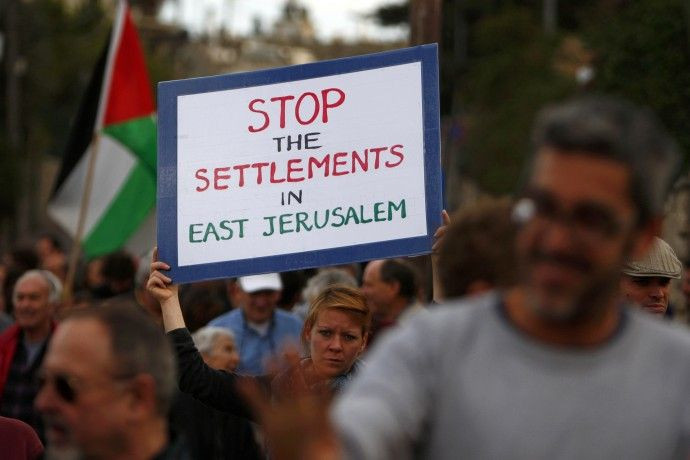Israel's policies stifling Palestinians: Report

Israel’s policies in West Bank and other districts are depriving Palestinians of basic necessities while providing lavish amenities to Jewish settlements, says Human Rights Watch (HRW), in a report released on Sunday. It slammed the Israeli government for violations of ‘International laws’ and Palestinian Rights. It also demanded a withdrawal from the settlements.
The report also comes at a time, when the US government has been pressing the Jewish state to halt settlements and engage with the Palestinian Authority. Arab leaders are reportedly drafting a resolution to be submitted to the U.N. Security Council urging the international community to step up pressure on Israel by enforcing sanctions and recognize the state of Palestine.
HRW maintained that Israeli government expropriated land from Palestinians for settlements, often demolished homes and communities, blocked Palestinians from using roads and reach agricultural lands; denied access to electricity, water; building permits for houses, schools, clinics, and other infrastructure. The Government is also accused of limiting the access to proper medical care for Palestinians. The group called upon foreign donors to suspend funding for Israel and discourage it over the settlement issue.
“The United States should consider suspending financing to Israel in an amount equivalent to the costs of the Israeli government’s spending in support of settlements and the discriminatory policies documented in this report, since the US’s $2.75 billion in annual military aid to Israel substantially offsets these costs,” it said.
“Foreign governments and businesses at risk of being tainted by Israel's unlawful practices should identify and end policies and actions that support them, the group maintained.
The 166-page report titled, ‘Separate and Unequal: Israel’s discriminatory treatment of Palestinians in the Occupied Palestinian territories outlined the government-led discriminatory practices ‘that have no legitimate security or other justification’.
Palestinians face systematic discrimination merely because of their race, ethnicity, and national origin, depriving them of electricity, water, schools, and access to roads, while nearby Jewish settlers enjoy all of these state-provided benefits, Carroll Bogert, deputy executive director for external relations at Human Rights Watch stated.
“By making their communities virtually uninhabitable, Israel's discriminatory policies have frequently had the effect of forcing residents to leave their communities,” it added.
The reports stated that according to a June 2009 survey about 31 per cent of Palestinian residents have been displaced since 2000 from West Bank and East Jerusalem. It maintained that in contrast to the Palestinian plight, the benefits offered by the Government to Jewish settlers help the inhabitants’ numbers swell from approximately 241,500 inhabitants in 1992 to roughly 490,000 in 2010.
US, in recent months, urged Israel to reinstate a moratorium on West Bank settlement building. Washington also promised military aid and maintained that it would not ask Israel for any further settlement freeze if this proposal is agreed upon. But, right-wing leaders in Israel pressurized Prime Minister Benjamin Netanyahu to refuse the proposal. Several religious leaders also stood up in protest of the Israeli's government attempts to consider the freeze.
Meanwhile, reports also suggest that the Arab states and Palestinian Authority are working on a draft to be submitted to the U.N. Security Council as a resolution denouncing Israeli construction in the West Bank and East Jerusalem.
The resolution is also likely to urge the international community to step up pressure on Israel over the settlement activity by enforcing sanctions and recognize the state of Palestine. Media reports suggest that the Israeli leadership fears that Washington, for now, might not rush in vetoing resolutions against the Jewish state as a result of the recent fallout between both countries.
© Copyright IBTimes 2025. All rights reserved.




















